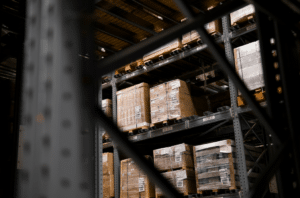Co-warehousing, Leasing Options • 9 Minute Read • Aug 4, 2024
Renting a Nonprofit Warehouse: Consider a Co-Warehouse

Space is often a determining factor in nonprofit growth. Perhaps your organization has never had its own space. Now, to impress donors, you need a more formal space and local address. Or maybe you need warehousing space for larger donations. Or, if you support a large number of volunteers, a common space to collect supplies could help you serve people more efficiently.
Sooner or later most nonprofits need space. At the same time, you have a financial obligation to make the most of your warehouse investment. Co-warehousing is a strategic move for non-profits because it offers a cost effective way to scale your organization while improving collaboration, brand reputation, and work/life balance.

What is co-warehousing?
Co-warehousing is a flexible storage and workspace solutions for-profit and nonprofit organizations. A traditional warehouse space is divided into smaller, more affordable spaces. The cost of the overall warehouse is split between many organizations. Co-warehouses often include amenities like shared docking spaces, conference rooms, or community kitchens.
Nonprofit professionals love co-warehousing spaces due to the flexibility in space and leasing, reduced costs, and community. All of which help your organization grow.

The 4 Benefits of Co-Warehousing for Nonprofits
Need a space that’s cost effective, has flexible leasing, and offers ample opportunities for collaboration? Co-warehousing can offer nonprofits the space needed to expand operations.
#1: Cost Effective
Co-warehouses are more cost effective than traditional warehouses. Previously, traditional warehouses required organizations to rent out the entire space. This often priced nonprofits out of their spaces. With co-warehouses, you’ll only be renting a portion of the space, making it more affordable than ever.
There’s also reduced overhead thanks to shared costs amongst tenants. Additional costs like utilities, security, landscaping, and more are covered collectively by all tenants rather than by your nonprofit alone.
Organizations in the co-warehouse often work together to get bulk purchasing discounts. This helps your nonprofit save on operational costs, too. Instead, you can use the savings towards fulfilling your mission.
#2: Resource Sharing
When it comes to tangible resources, some co-warehouses have additional equipment that you can use. Forklifts, pallet jacks, dollies, shelving and more are sometimes available through the co-warehousing management team for tenants. Again, this can act as a cost savings, as you won’t have to buy these additional items with donor funds.
You’ll also have access to shared expertise. In many ways, nonprofits have to run like a business, so it’s beneficial to be around like minded business and nonprofit owners. This community aspect of co-warehousing allows you to learn from the knowledge and expertise of other organizations.
Many co-warehousing spaces also have community spaces, making the area you’re leasing feel much bigger than the actual rented square footage. You’ll likely have kitchens, conference rooms, and outdoor spaces where you can have meetings with volunteers, donors, staff, and clients. Imagine not needing to use your home for another volunteer meeting ever again.
This helps set you set a healthy work/life boundary. Nonprofit owners work hard enough. You should at least have the option to take your work home with you, or to leave it at the warehouse.

#3: Scalability and Flexibility
Co-warehouses offer flexibility and scalability that traditional warehouses lacked. Need more space because your organization is growing? A co-warehousing space can likely accommodate that. Need more space because your nonprofit has some seasonality to it, like collecting toys during Christmas for kids in need? That’s also not a problem.
Flexible contracts in co-warehousing spaces allow nonprofits to use the space they need when they need it, without locking them into larger spaces for extended periods of time.
Also, if you’re a newer nonprofit that doesn’t have a physical address, you can use the co-warehousing address. Adding a physical location to your Google Business page can help with local SEO and will make your organization look more professional than a “pop-up”.
The more professional your organization looks, the more seriously donors will take you.
#4: Collaboration
Co-warehousing gives you the opportunity to get your nonprofit in front of more people in your community. Afterall, there are lots of people sharing the same warehouse space as you. And, they may have never heard of your nonprofit.
Imagine being able to walk down a hallway and asking 10-15 business owners if they’d be interested in helping out with a volunteer day. All without leaving your co-warehousing space. Or, perhaps you need donations for your next raffle. This is likely something the ecommerce business owners in your co-warehousing space can help out with.
Working closely with other business and nonprofit owners gives you the opportunity to network and partner on collaborative projects. For example, perhaps something you’re buying is something another organization throws away. It’s a win/win for you to repurpose that material!
It also gives you a more formal space to collaborate with donors, clients, volunteers and employees. A dedicated meeting space provides you with one area where you can solely focus on your nonprofit and help it grow.
Selecting the Right Co-Warehouse
Selecting the right co-warehouse is about determining your needs, ironing out the legal and financial aspects, and considering what else you want in a space.
Assessing Your Organization’s Needs
As a scrappy nonprofit owner, you’ve likely calculated the exact amount of space you need to grow your operation. Try to also consider how you’ll use your warehousing space. How many volunteers will need to be able to work out of your space? Will there be enough room without everyone bumping elbows?
Also, you may have special requirements, like a climate controlled space, specific permitting, or zoning. Make sure the co-warehouse you select can accommodate any of these requirements before signing a contract.
Sort Out the Legal and Financial Aspects
Spend some time familiarizing yourself with the contract terms and conditions once you think you’ve found the right co-warehouse. While a building may seem like a great fit from a tour, once you dig into the agreement you’ll really find out if the space is the right fit.
If you still need help with financing, consider checking out real estate grants on grants.gov. Some of these grants cover rent, purchasing a new property, or making improvements on an existing property.
Consider Helpful Amenities
Think up all the things you’d love to have included in your co-warehouse. Make a list of everything that would make your experience better.
Some common ones often available at co-warehouses include meeting spaces, a shared kitchen, shared bathrooms, outdoor spaces, security, free wifi, and more.
How can nonprofits get free space?
Nonprofits can get free warehousing or office space by asking landlords to donate the space to their 501(c)3 tax-exempt organization. While finding a free space is great, it does come with some negatives all nonprofit organizations should consider.
As the adage goes, you get what you pay for. While you likely don’t need a luxury space, you’ll be stuck with whatever the landlord gives you. This could be their space with low ceilings, a draft, or humidity problems. Less desirable and harder to rent spaces are the easiest ones to give away. These may not end up being a great fit for your organization long-term.
Also, businesses tend to be most generous during profitable periods. If the economy takes a turn for the worse, your organization could be an easy eviction. Or, if their warehouse space becomes highly desirable, they may ask you to leave to rent out the space.
Renting a smaller, more modest space could help you grow your nonprofit more than a free space – which is why all nonprofits should consider co-warehousing.
Can I just use community spaces for my nonprofit meetings?
Yes, you can solely use public community spaces (like coffee shops) for your nonprofit meetings. But, when you rely on community spaces you won’t ever have full control over what happens.
For example, you might show up for a meeting to find the space you hoped to use is unavailable, or temporarily closed. Or maybe at the coffee shop where you’re meeting with an important donor someone talks really loudly on zoom with their doctor about a new mole they just found on their back.
Investing in a more professional space, like a co-warehousing space allows you to meet with donors, volunteers, employees, and clients in a professional setting that you have some control over. For example, most co-warehousing spaces, like our co-warehousing space in Atlanta, have meeting spaces and office spaces you can rent out or book for a few hours.
Depending on how much space you have, you can also get permission to host larger events with more people. In your own co-warehousing space, you’ll have full control over set up, take down, who can come, marketing, etc – because it’s your space.
As always, double check leasing terms before hosting a giant event.
While you can use community spaces for your nonprofit, eventually you will likely need a more professional space you have full control over.

Is your nonprofit ready to invest in a co-warehousing space?
To grow your nonprofit, eventually you have to invest in space. What that space looks like, and how many ways it serves your organization is up to you.
Whether you want to accept large donations, store more small donations your organization needs, meet as a team in an actual conference room, or a more professional space to network with donors, co-warehousing can fulfill all these needs and more.
Are you a nonprofit based in Atlanta? Consider checking out the Shift HQ Atlanta co-warehousing space. Follow the link to learn more about our unique warehouse solution.




